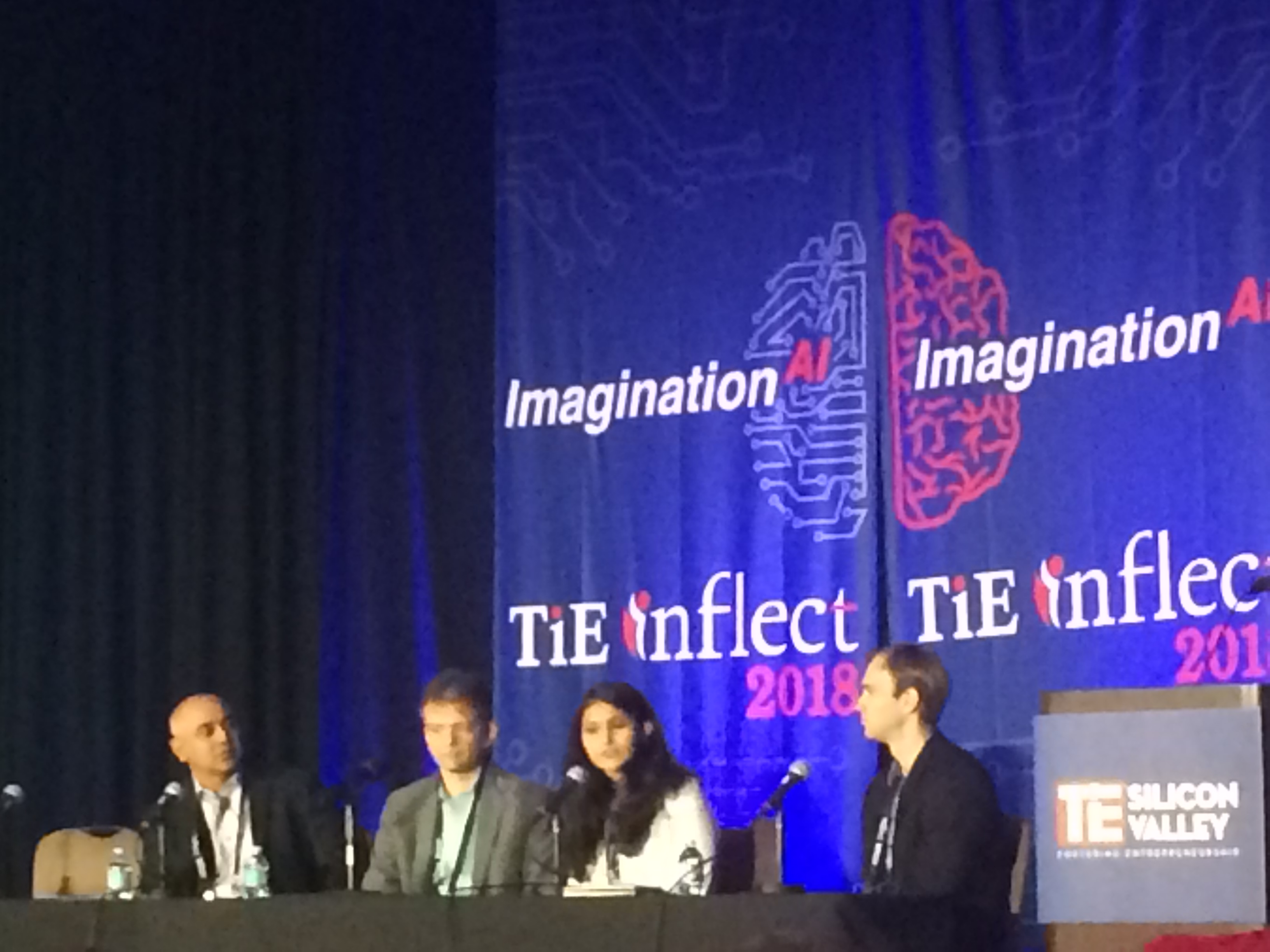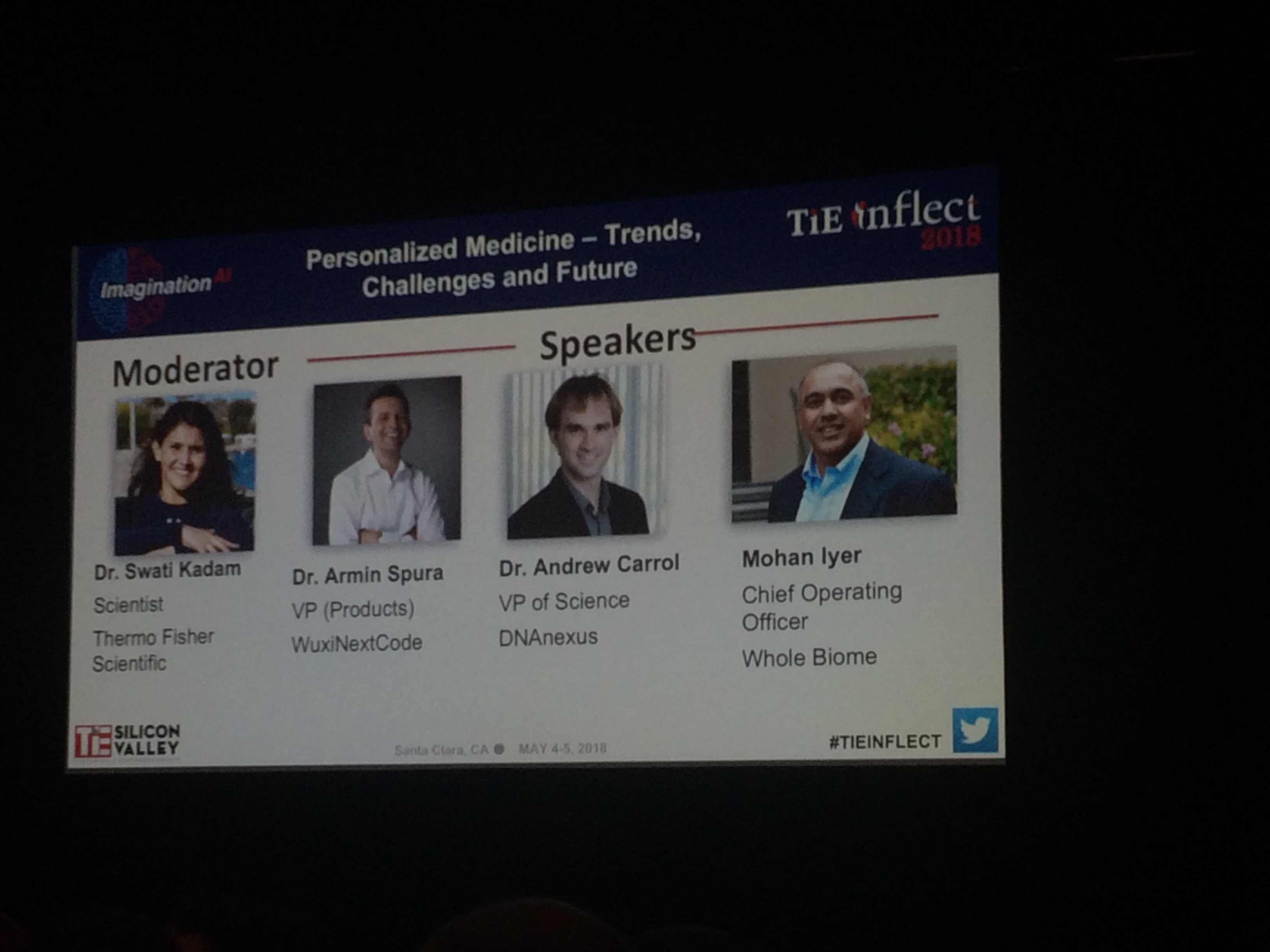
SANTA CLARA, CA: The largest technology-based entrepreneurship conference in the world- TiE Inflect 2018, took place at the Santa Clara Convention Center on May 4 and 5.
TiE stands for The Indus Entrepreneurs network (Indus refers to South Asian origin) and was founded more than 25 years ago by a group of Indian immigrant technologists and entrepreneurs. Today, it has grown into an organization that is spread out across different cities and countries and its conferences attract thousands of professionals and entrepreneurs from all over the world.
This time, the annual conference, TiECon, was renamed TiE Inflect, and its main areas of focus were AI (Artificial Intelligence) and Blockchain. Spread over two days, there were several tracks – Fintech (Financial Technology), Martech (Marketing Technology), Health Tech,Emerging Technologies, AI/Machine Learning, Blockchain, DevOps, TiE Women, TiE Youth, Words of Wisdom (for entrepreneurs who were starting out), Cybersecurity, Internet of Things (IoT), Global Connect Inbound and Global Connect Outbound.
Several IT companies, law, immigration and consulting firms and non-profits had set up booths in the exhibit hall and the presence of local media companies made it a really happening event.
One of the main takeaways from the Fintech track was that AI is revolutionizing the way people interact with their bank, however, being highly regulated, certain innovations will take time to take hold in the sector.
Some panelists emphasized that it was important to focus on the business/customer problem rather than on shiny new technology.
They cautioned, “Blockchain by itself is not going to solve anything.”
Blockchain is a system of distributed ledger with tokens that are validated by complex hashing methods performed by people who are called “miners”
It is predicted that it will eliminate the middleman in every field.
In the financial sector, for example, it will help facilitate the movement of money across borders in a revolutionary way.
Christa Steele, Founder Board Room Consulting, LLC, further elaborated on how artificial intelligence (AI) and Blockchain were shaking things up from wealth management advice to gamification of the payment service and customer service banking areas.
Incidentally, being a non-techie, Christa gave one of the best explanations of Blockchain technology, saying that this could be applied to any sector from food to music to County records. Being a fan of efficiency, she loves the fact that using Blockchain shortens processing times significantly for various transactions.
She said, “Blockchain is here to stay.”
In her closing remarks, Christa warned, “Disrupt yourself before you get disrupted.”
In the Artificial Intelligence track, Beth Smith of IBM Watson opened the session. She spoke of the various uses of AI from fighting counterfeiters and hackers to AI-powered microscopes monitoring ocean plankton for pollution levels and quantum computing becoming mainstream within the next few years.
In the dedicated Blockchain track, crypto-currencies and ICOs (Initial Coin Offering) were discussed.
Similar to an IPO (Initial Public Offering), an ICO is a way of inviting people to invest in one’s company by buying crypto-currency.
One of the concerns in all the technological hoopla is the very real possibility of the tremendous loss of jobs. However, the panelists said, “The intermediary is the one at greatest risk of losing his/her job.”
One of them even went on to predict, “Blockchain is the 4th major revolution, that is how disruptive it is.”
On the non-technical side, in the closing keynote of the TiE Women track, Ellen Petry Leanse, author of “The Happiness Hack” and corporate coach, emphasized the role of gender equality and diversity in the advancement of society and profitability of companies.
Thomas Kurien, President, Product Development, Oracle delivered one of the closing grand keynotes of Day 1, touching upon the use of AI in reducing wastage of pharmaceuticals to the Internet of Things (IoT) being used to make ride-sharing more profitable to a future with serverless infrastructure and self-running software akin to self-driving cars.
The last grand keynote of Day 1 was by Hadi Partovi, the CEO and founder of Code.org. Thanks to this organization, millions of kids in the US – who would have otherwise not had access to programming/Computer Science education in their schools – are learning to code. As Hadi explained, computer education is the gateway to the better paying jobs of the future even as millions of mundane jobs are predicted to disappear.
 The Health Tech track, which was opened with a keynote address by Dr. John Mattison, Chief Health Information Officer of Kaiser Permanente, had discussions on personalized medicine and apps that deliver cognitive behavioral therapies (CBTs) that are more effective than traditional drugs in treating diseases such as Type 2 diabetes, anxiety and depression that have a behavioral component.
The Health Tech track, which was opened with a keynote address by Dr. John Mattison, Chief Health Information Officer of Kaiser Permanente, had discussions on personalized medicine and apps that deliver cognitive behavioral therapies (CBTs) that are more effective than traditional drugs in treating diseases such as Type 2 diabetes, anxiety and depression that have a behavioral component.
In the Emerging Tech track, Graham Mackintosh, AI Lead of the NASA Frontier Development Lab (FDL), talked about Space Science and Deep Learning and the search for extraterrestrial life. In a very engaging presentation, he said that maybe we humans are not that smart and that is why we were unable to pick up signals by extraterrestrials who were probably far more intelligent than we could ever be.
Later, he joined NASA scientists, Madhulika Guhathakurtha, Bill Diamond and Dan Rasky – the inventor of the heat shield that is used in SpaceX rockets – for an interactive session (called a “fireside chat”) in the exhibit hall.
On Day 2, aspiring entrepreneurs had a lot to learn from Jyoti Bansal, CEO of Harness, who sold his earlier startup to Cisco. Bansal chatted with R. Paul Singh, one of the TiE conveners, about his own journey and the importance of believing in oneself and one’s idea. He shared a few key learnings – how an entrepreneur needs to build up his/her skills in sales, on starting a company only when one is passionate about an idea and pitching to investors. He also touched upon the meaningless regulations around H1-B visas that thwart entrepreneurship.
There are many fears around AI similar to the dystopian sci-fi view of robots taking over our lives. On the other hand, the technology offers great hope.
As Deepak Agarwal, VP of AI at LinkedIn said, “No technology is inherently bad.”
Rama Akkiraju, Distinguished Engineer, IBM Corporation, opined on the possibilities that AI offers – from chatbots that free up time from mundane tasks to self-driving cars that cause no accidents and have better traffic management to a corruption-free society, to help for doctors in remote areas and legal assistance.
To paraphrase Aldous Huxley positively, “It is a brave new world.”
Lakshmi Iyer
India Post News Service






